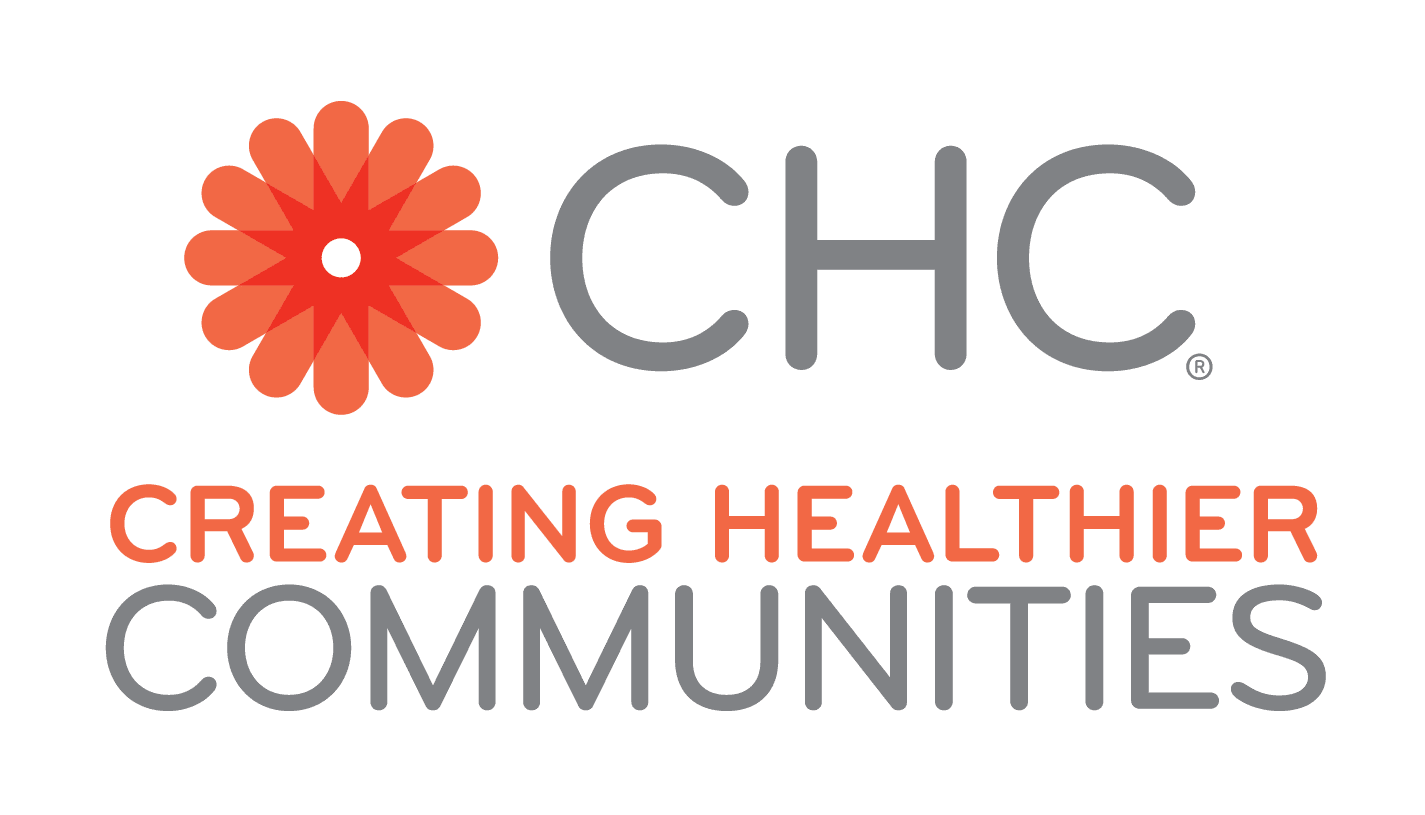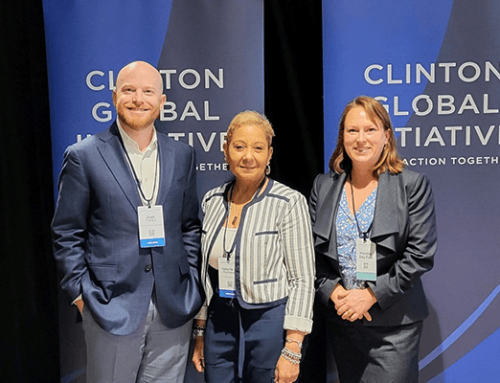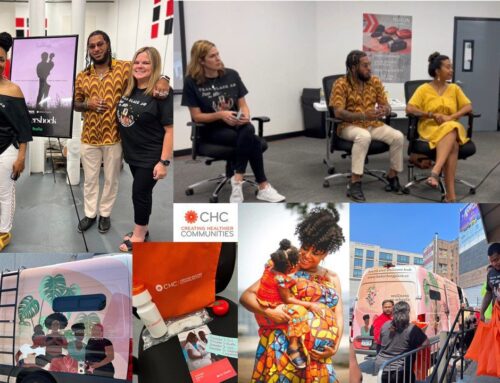Honoring mothers by fighting for them all year long
By: Jean Accius, PhD, President and CEO of CHC: Creating Healthier Communities
This weekend we will celebrate Mother’s Day. I cannot help but think about my mother and grandmother. Around the time of my birth, my mother came to the hard realization that neither she nor my father was in a position to fully care for me. She made the difficult, life-changing decision to place me in my grandmother’s care. I am certain my grandmother didn’t envision that after raising her own children, she would one day be the primary caregiver of a one-month-old.
Nevertheless, she took on the responsibility with grace, dignity, and a fierce determination to ensure that I would have a bright future. She sacrificed so I did not go without. I am forever grateful for the decision she made to raise me during those formative years and for everything she did that helped me become the person I am today.
In the spring, we welcome life and rebirth after the cold winter months. It’s only fitting that May is dedicated to observances focused on mothers, including Maternal Mental Health Month, World Maternal Mental Health Day, and of course, Mother’s Day.
For many, this month is one of joy, celebrating those who raised and nurtured us. For others, it’s a poignant reminder of the women — and/or children — lost. We may not all be mothers, but we all know mothers and expectant parents. As President & CEO of CHC: Creating Healthier Communities, I can tell you there is no more important way to honor those who gave us life than to protect the health and wellbeing of expectant and new mothers and their children.

CHC is dedicated to ensuring every person in every community has an opportunity to live their healthiest life. Maternal health and mental health are two of our three core pillars; they are inextricably interconnected and unfortunately, more salient than ever. The urgency cannot be understated. Black women are three times more likely to die from pregnancy related causes in the U.S. and 50% more likely to deliver a premature baby (CDC). Shockingly, 84% of maternal deaths are preventable, according to the CDC. Let that sink in.
Maternal health and infant death are leading indicators of health equity, as identified by the U.S. Department of Health and Human Services’ Healthy People 2030 objectives. How we as a society care for our mothers and children — those who are most vulnerable — defines who we are.
And we have no time to lose. Despite our nation’s collective wealth and scientific advancements, health outcomes remain staggeringly poor relative to other industrialized nations.
Maternal Mortality Rates in the Unites States have increased nearly 64% between 2019 and 2021 alone; overall the U.S. ranks worst, over 3x worse to be exact, than all other high-income countries. Not only are 84% of pregnancy-related deaths are preventable, but for women of color, it’s even worse. Black women are 300% more likely to lose their life due to pregnancy-related causes. And this has nothing to do with income or socio-economic status, as exemplified by the tragic postpartum passing of Dr. Chaniece Wallace as well as Serena William’s experience giving birth. Education, resource access, financial status and even fame are no match for the inequities in our healthcare system. We must listen and support women.
Often, when a mother’s health fails, so does her baby’s. If you thought Maternal Mortality Rates were inexcusable, then brace yourself: the United State has the highest infant mortality rate of all 27 high income countries, with an average of 6.1 fatalities per 1,000 live births. An American baby is 3x less likely to see their first birthday than a Finnish baby, half as likely as a Spanish one, and less likely than to survive its first year than an infant born in Belarus, Hungary, Slovakia or Cuba.

As if the physical dangers of maternity weren’t enough, we must not forget the equally perilous mental health challenges. Up to 20% of women experience significant mental health concerns from pregnancy up to a year following delivery, sometimes called the fourth trimester. Mental health played a role in more than 42% of maternal deaths, according to the Maternal Mortality Surveillance Program.
What’s equally troubling is how little we hear about these common struggles or preventative measures. Fewer than 20% of pregnant or postpartum women are currently screened for these mental health challenges, and only 50% of those who diagnosed are given follow-up care.
These issues are a top priority to ensure all people can live their healthiest life — not only in service of all these women but also for their families, communities and our larger society whose wellbeing depends on them.
What can we do?
Here at CHC, our Black Birthing Initiative,, with significant support from Elevance Health Foundation, prioritizes both physical and mental health for pregnant and postpartum women, with an emphasis on reducing stressors and other health-related social needs that can lead to preterm births. Taking a community-driven approach, this initiative works closely with local organizations to support expectant parents and intends to develop a standardized screening tool and evidence-informed interventions.

We at CHC continue to host “Aftershock” documentary screenings with partners like Hilti, MetroHealth, Saks and others to raise awareness of the maternal health crisis and its ripple effects. Aftershock shines a much-needed light on the high rates of preventable maternal mortality among Black women in the U.S.
We also collaborate with companies including Saks, the WNBA Connecticut Sun, Hilti and Elevance to assemble Healthier Mom Kits, donated to birth centers. These kits filled with educational resources and essential items are given to pregnant women in underserved communities who may be at higher risk for premature birth complications.
Such work is powerful, life altering and often lifesaving. But it’s not enough. There must be collective, concerted focus on maternal health. We must collaboratively address root causes and create accessible interventions from early pregnancy through post-partum. We must work together on systems change. In May, we honor mothers. But every day of every month, we must fight for them.

Sources:
· https://www.cdc.gov/hearher/pregnancy-related-deaths/index.html
· https://med.uth.edu/psychiatry/2020/05/27/maternal-mental-health-awareness-month/

Jean Accius, PhD, President and CEO, CHC: Creating Healthier Communities
Dr. Jean Accius is an accomplished leader and innovator in health equity, longevity, health systems transformation, and building equitable systems so that every person in every community can live a longer, healthier, and more productive life.
As President & CEO of CHC: Creating Healthier Communities, Jean leads a high-performing team that is dedicated to breaking down the barriers to health and empowering communities to thrive. With business acumen and deep experience across sectors, Dr. Accius understands how to develop creative and actionable solutions, policies, and programs that uncover the economic advantages of addressing disparities. He has a proven track record of collaborating across the public, private, and nonprofit sectors to accelerate the pace of change. Learn more.





